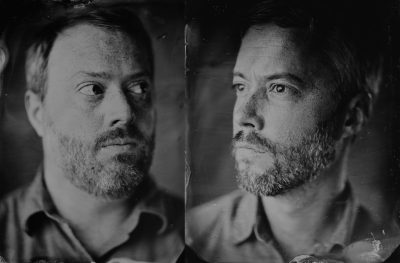Will and I go way back. I still remember the first time I heard his Philly-based band, East Hundred, in 2008 and fell in love with the song “Slow Burning Crimes.” I was playing in a band at the time and female-fronted groups were hard to come by in our city. We bonded over our similar styles and I had the privilege of learning from Will and the rest of his group when we shared the stage. Even after East Hundred broke up, I followed Will’s career-from experimental projects (like an original opera performed in an abandoned pool) to his work as a film and television composer. Working alongside his brother, Brooke, the Blair Brothers have steadily built a name for themselves. From Sundance to Netflix, their music has shaped stories and captured imaginations. Check out Will’s thoughts on his work as a composer and the steps that led him to where he is today.
Table of Contents
Tell us about your life as a composer for film and television. What does your day-to-day work look like?
The bulk of our time is spent scoring feature films, although we’ve score a few seasons of TV which is very different. We work on a lot of thrillers, or tense dramas. The occasional horror movie or dark comedy. We’ve been fairly good about spreading out projects to focus on one at a time, if we can – but post production schedules shift so often, that we have to adjust and films often overlap with each other. My brother (Brooke) handles all of the final steps and final delivery including pre-mixing, stemming instruments together into sub-groups, coordinating with the final mixer who’ll be receiving our score – AND he’s often addressing the very last few minor tweaks or notes we’re asked to do to our scores.
I often get the next film started – I’ll read the screenplay, pitch some ideas about instrumentation and get a dialogue with the director moving along and a schedule with the producers in place. But in the middle of the project – both my brother and I are digging into the actual composing together. (Sometimes actually together – bouncing ideas back and forth – but also splitting up certain sections of the movie and working separately.)
There’s a few films that we’ve done all by ourselves, each playing all of the instruments in the score – but if the budget and overall instrumentation calls for it, we always try to bring in soloists or small ensembles to help us with performances. We work often with a string quintet and a great solo cello player, a violist – some woodwinds and brass. We’ve put a small choir together on occasion. Traditional Inuit throat singers from remote Canada and we even worked with the ( two time winning ) World Champion of Whistling.
How did you get involved in music? What led you there?
I think we came from a fairly creative household – we were always encouraged to do something athletic and something creative. We both veered towards creative pursuits. Our oldest brother was always experimenting with film – and for some reason, we were drawn to music, although the idea of film was always really exciting as well. So most of our teens / 20’s and into our 30’s we were playing in bands; touring and recording and songwriting. My brother and I worked apart when we were younger and still learning, ( and maybe more competitive?) But as we got into college we realized we could really compliment each other by taking music seriously and working on it together. But we always maintained an interest in film and relationships with young aspiring filmmakers we knew from growing up. That led us to collaborating primarily with Jeremy Saulnier who has been making films since we were kids – and eventually he invited us to work with him composing scores for his films. He is a very gifted filmmaker and literally taught us how to score films effectively while working on his earliest films.
Who were the biggest mentors in your field?
Again – I think our oldest brother Macon and Jeremy Saulnier ( who are also creative partners in many film projects, “Blue Ruin”, “Green Room”, “Hold The Dark”) – have had the biggest impact on our career and on us creatively. They inspired us when we were young kids and they were making cool DIY backyard film projects, but they also really got our foot in the door with a lot of our early film scoring experience. I think we also learned a lot about the business side of filmmaking and some of the expectations between different departments of film and how we are expected to work together. Macon and Jeremy are each writers, directors, producers and actors, so they’ve had a lot of experience to share with us. They also helped us define our tastes in film and music and humor, which we very much share with them and we feel it’s reflected in our work.
-
Brooke Blair and Will Blair
As far as composer mentors, I don’t know if we ever have had one, personally. But we have some favorites for sure whose brains’ we’d love to pick.
What is the hardest part of your job?
There is a lot of isolation. In the middle of a film ( which can take upwards of 8 weeks), after some of the excitement of starting a new project subsides – it can feel quite isolating. There’s days on end in the studio, often alone – just with your ideas, and you’re hoping they’re still good ideas. Again – bringing in other musicians to work with and having a creative partner in each project helps – but it’s not nearly as social as working in a band setting and not nearly as immediately gratifying as say, performing live for an audience or recording your own record.
What is the best part of your job?
The constant variety. We’re always being asked to write music for an entirely different character, different story and setting with every project. Every director has different tastes and preferences and ideas for what the score should sound like – so we’re constantly asked to reinvent our sound and create something we wouldn’t have dreamt up on our own. We’re lucky to have a revolving door of various outside collaborators pushing us somewhere new and essentially these directors are our bosses – and in a certain sense, they’re telling us what to do. But then we get a new boss every couple of months!
Did you have any influential music teachers in your life growing up? Tell us about them.
Miss Norchi! She was our first elementary school music teacher and she managed to make music VERY fun and very freeing and very approachable. I think music can be a little confusing or intimidating for certain children – and Miss Norchi had a way to relax the entire classroom with music and allow us to trust ourselves with new instruments or songs. She was a great teacher. When we’d act up or misbehave – she would march to the piano and HAMMER OUT an INTENSE and SCARY chord progression which quickly got our attention! We realized how much raw emotion you can convey through a few carefully constructed chords – and I think we still apply that concept to everything we do today.
What do you wish you had in school that would have better prepared you for what you’re doing now?
Just some of the basic best practices involved in scoring movies. How to organize and plan a score – how to communicate with a director – how screenplays are structured and why that matters to our work – how the business works – what are some of the technical requirements needed to score a movie? The nuts and bolts, procedural parts of composing for film could’ve been helpful to know before getting into the field. The music itself comes from inside you and your own experiences so in some ways it might be harder to teach, but the day to day workflow is something that can be very teachable. We still are learning all of these different processes on the fly.
What advice would you give to someone trying to “make it” in the music industry?
STICK. WITH. IT. In our case – we were sticking with a goal of “making it” in the music industry specifically, which inadvertently led us to a career in the film industry with music. So we did not have a straight path by any means. But we stuck with it and believed we had something to offer – AND – we got to the point as adults that we really didn’t know how to do anything else … well. We never had a solid back up plan – which I think continued to push us towards new avenues with our music. I think its horrible advice to say “do not have a back up plan” – but, there you have it.





Leave A Comment